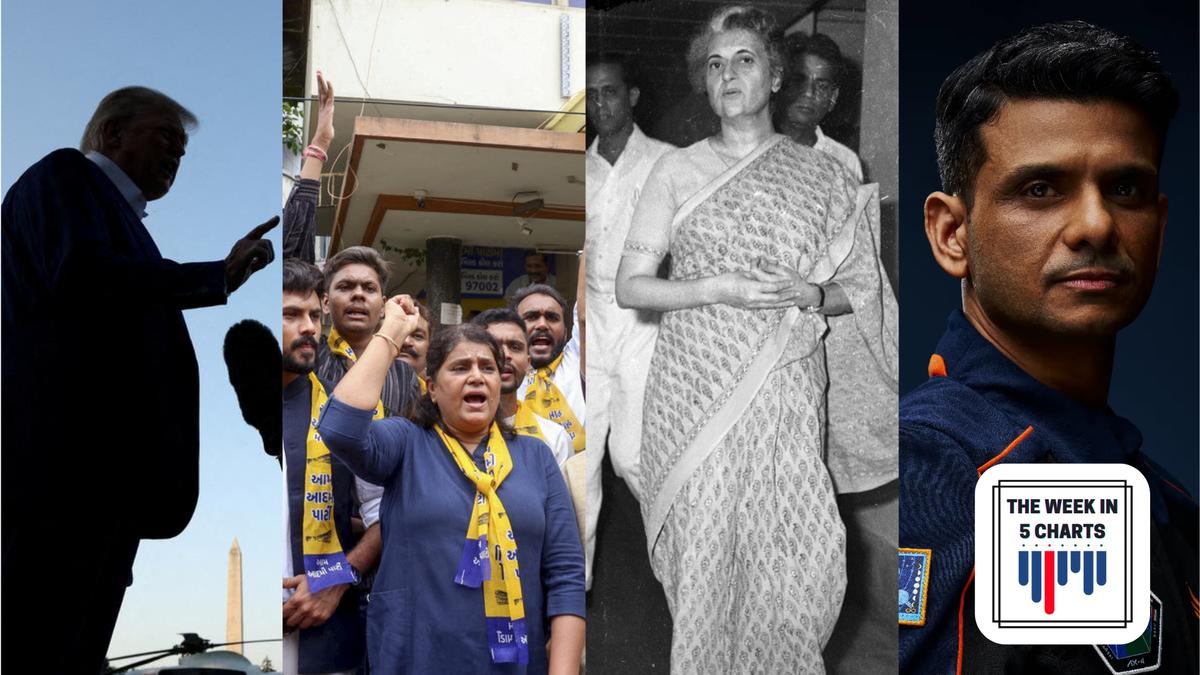(1) Shaky ceasefire between Israel and Iran appears to hold
U.S. President Donald Trump said on Tuesday that a ceasefire between Israel and Iran was “in effect”, after the truce, which he announced early morning, seemed unravelling following accusations of violations from both sides, prompting Mr. Trump to curse them and issue a rare public demand to Israel to stand down.
The day witnessed dramatic developments as both Israel and Iran carried out massive strikes against each other in the final hours before the intended start of a 7 a.m. ceasefire (Doha time), announced by Mr. Trump. The Israeli Defence Forces said it struck eight Iranian ballistic missile launchers in western Iran. Tehran fired at least 20 ballistic missiles in six barrages, which started at 5 a.m. local time. Four people were killed and at least 22 others injured in Iran’s missile attacks.
Here is a brief timeline on how the 12-day war panned out
(2) Revisiting the Emergency
One of the turning points of Indian politics, the Emergency was set in motion by the Indira Gandhi government on June 25, 1975, and remained in place for 21 months till its withdrawal on March 21, 1977. The order gave Indira Gandhi, India’s first woman Prime Minister, the authority to rule by decree and saw the large-scale curbing of civil liberties.
The then President Fakhruddin Ali Ahmed announced a nationwide state of emergency, citing “an imminent danger to the security of India being threatened by internal disturbances,” particularly after the war with Pakistan and the liberation of Bangladesh.
It was imposed just days after Indira Gandhi was convicted by Allahabad High Court for electoral malpractice in a case filed by socialist leader Raj Narain who challenged her win from Rae Bareli Lok Sabha seat. The conviction led to her disqualification as an MP and Emergency allowed her to continue as Prime Minister.
The oppressive Maintenance of Internal Security Act was passed during the Emergency era. There was large-scale suspension of fundamental rights for the citizenry, detention and arrest of Opposition leaders and critics, and press censorship. The 38th Amendment Act of 1975 also made declaration of a national emergency immune to judicial review (this was later removed by the 44th Amendment Act of 1978).

(3) Results of 5 Assembly bye-elections: AAP wins 2, BJP, Congress, and TMC secure 1 each
After the drubbing in the Delhi Assembly polls earlier this year, the Aam Aadmi Party (AAP) was in for a good news on Monday as the party managed to retain Punjab’s Ludhiana West and Gujarat’s Visavadar seats in the Assembly bypolls.
While reacting to the bypoll wins, former Delhi Chief Minister Arvind Kejriwal said he would not become a Rajya Sabha member in the wake of party Rajya Sabha MP Mr. Arora’s election as MLA.
The Trinamool Congress retained Kaliganj in West Bengal while Nilambur in Kerala went to the Congress. The BJP managed to retain Kadi in Gujarat.
In Kerala, it was a setback for the Left Democratic Front (LDF) government as the opposition Congress-led UDF wrested the Nilambur assembly constituency from it by a margin of 11,077 votes. Congress’ Aryadan Shoukath, son of late Congress leader Aryadan Muhammed, defeated CPI(M) state secretariat member M. Swaraj.
The bypolls in the five constituencies were held on June 19 and the results announced on Monday (July 23, 2025).
(4) Shubanshu Shukla becomes first Indian in International Space Station
Shubanshu Shukla with a crew of three others became the first Indian to visit the International Space Station as part of the Axiom-4 mission on Wednesday (June 25, 2025) last week. Shukla will be working on research related to human survival in space and microgravity.
His findings are meant to support India’s ambitions for the upcoming Gaganyaan mission and the country’s future space station – Bharatiya Antariksh Station. Under the recently expanded budget for Gaganyaan (₹201.93 billion), the BAS was included, along with two crewed and six uncrewed missions by 2028.
The government will also focus on fostering partnership with private players, international collaboration and technological research. To this end, it announced a venture capital fund of ₹1000 crores for the space sector for the coming five years.

(5) India breaks into top 100 countries achieving SDG goals
India ranked within the top 100 countries making the most progress on Sustainable Development Goals (SDGs) for the first time as per the report released by the UN Sustainable Development Solutions Network released on Tuesday (June 24, 2025) last week.
The report laid out 17 SDGs measuring progress in indicators like poverty reduction, hunger, health, education, climate action, employment, energy, sanitation and more. India’s overall score for the SDG index stood at 66.95 out of a maximum score of 100.
While the overall score has been improving since 2000, the report pointed out stagnating progress in 7 of the 17 indicators, moderate improvement in 7 others, on track trends in two and worsening progress in one indicator.

Published – June 30, 2025 03:17 pm IST
